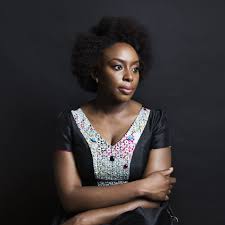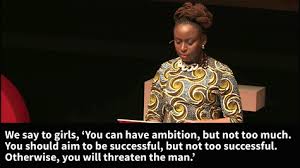Recently, I’ve been trying to break away from my Netflix addiction and channel my free time to reading more books and listening to podcasts. Of course I still give in every now and then but I’m really trying to make an effort to actually start being more mentally productive with my spare time. Basically, I’m trying to channel my inner adult (if it’s even there??? we’ll see I guess) and I’m starting by being more active in my awareness of the world around me and becoming more in tune with my values.
As a part of this ~spiritual~ journey I’m on, I decided to get myself a copy of “We Should All Be Feminists” by Chimamanda Ngozi Adichie. My sister and one of my best friends both loved this short read and thought that I would relate to it and absorb it is as much as they did.

This short book was written by Adichie and it is based on a Ted Talk that she gave back in 2012 about stereotypes associated with Africa. In this book, Adichie relates the stereotypes associated with African culture with the stereotypes often found in feminism. Her insight on African culture, being that she is originally from Nigeria, and the way that she was able to associate this knowledge with the stigma that surrounds feminism was a really interesting and new way of looking at feminism for me. Adichie talks a lot about how in most African culture, it is uncommon for a woman to be able to provide for her family, be in public without a male presence, and more.
The beginning of “We Should All Be Feminists” starts off in such a powerful and personal way for Adichie as she explores the root of her first encounter of the word “feminist” and all of the phases it went through over the years. She goes from “feminist” to “happy African feminist who does not hate men and who likes to wear lip gloss and high heels for herself and not for men” after all of the things people had told her over time about what kind of feminist she should or should not be. Adichie makes this point in such a powerful way because she then explains that all of these specifics added on to the word “feminist” creates such a negative connotation for the word that strips it of it’s real meaning. She is making the point that being a feminist has added on the stigma that you are a specific type of person (someone who hates men, doesn’t shave her armpits, hates makeup, etc.) and that being pigeon-holed into that description is not only incorrect but unfair to the strength in being a feminist.
Adichie moves on to talk about her first experience with being discriminated against based on her gender and it happened at a very young age in her classroom in Nigeria. She had not been awarded the position of “Class Monitor” in grade school even though it was clear that she had been the most qualified based on her teacher’s requirements. Even though she had clearly earned the spot, it was awarded to a boy in her class because girls couldn’t be in a position of power. I thought about this part of the book a lot as I continued to read Adichie’s story. I thought back to when I was in grade school and tried to think of a time when a teacher or person of authority had taken away my ability to do something and become a leader. I couldn’t think of one. It was amazing to me that Adichie and the rest of her classmates had learned at such a young age that girls and women couldn’t do the job of a man and weren’t afforded the ability to have an opportunity to lead, and that really spoke to me a lot. I was lucky enough to grow up in a community where gender was not categorized into such concrete roles. This part of her book is where I truly recognized my privilege.

Adichie makes a really important point throughout this reading that all of these stereotypes are culturally taught and by no means brought about by nature. She tells more of her own personal experiences with male and female stereotypes as well as stories from women she knows. One quote from this reading that stuck out to me was this:
“We spend too much time teaching girls to worry about what boys think of them. But the reverse is not the case. We don’t teach boys to care about being likable. We spend too much time telling girls that they cannot be angry or aggressive or tough, which is bad enough, but then we turn around and either praise or excuse men for the same reasons.”
To me, this is a HUGE part of the problem that modern feminism faces today. Even in American culture, we teach our sons and daughters these roles and are completely unconscious to the damage it is causing. We must teach our daughters that the role of a woman is not subjected to a caretaker and that women have the power and intelligence to lead. We must teach our sons that having emotions and sharing the role in caretaker does not strip him of his masculinity, but makes him even more well rounded. We must teach the children of our future to get rid of the stigma surrounding gender. We must allow women to achieve as much as men and be just as strong without negative connotation. Once our society is able to rid ourselves of these stereotypes, we will be able to move forward as a culture and become equal in all aspects of life.

This is amazing
LikeLike
Yikes, I do not agree with your professor’s mind set. It’s disingenuous and relies on an old-fashioned mentality that also subscribes to the “you bought it, you own it” mentality. I think it’s important for women to actually be equal, not just when it suits them. Or their pocketbook.
LikeLike
I agree, however, if a woman’s comfort zone is allowing men to lead the way in regards to a first date, she shouldn’t put herself in an uncomfortable position based on sexism that lies within those old fashioned standards. I think that’s where the debate with my professor became stagnant. Thank you for your input and for taking time to read my post!
LikeLiked by 1 person